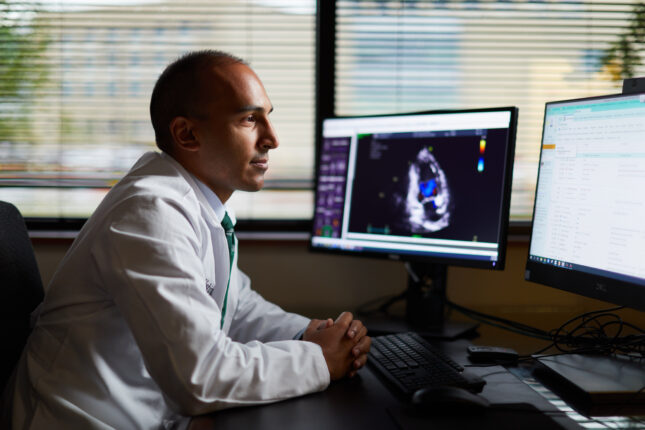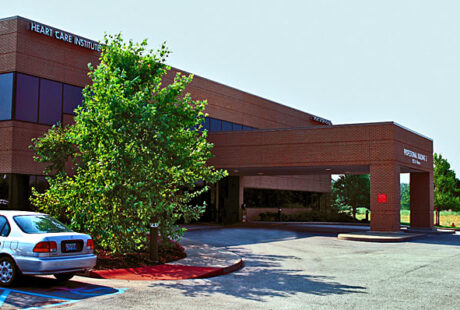
We are dedicated to improving the cardiovascular care of high school, college, professional, masters, tactical, and recreational athletes.
As the first and only sports cardiology program in St. Louis, we aim to prevent sudden cardiac arrest, treat cardiovascular symptoms during exercise, and enhance your physical fitness. Partnering with world-renowned experts within Washington University in St. Louis and multiple cardiovascular centers of excellence, we provide individualized heart assessments and treatment plans that are designed specifically to reduce and/or treat any possible cardiovascular disorders that could compromise your safety and performance.
The field of sports cardiology can be characterized as a spectrum from “prevention” to “promotion.” The former aims to prevent a major cardiac event, such as a heart attack, sudden cardiac arrest, or death, through thoughtful preparticipation evaluation, cardiac testing if indicated, and appropriate follow-up, management, and/or consultation with experts. Emergency action planning for a major cardiac event is paramount; the first sign or symptoms of heart disease could be the sentinel event itself. Promotion entails efforts to “return to play” safely through appropriate management of known cardioavscular disease or evaluating for previously undiagnosed heart disease.
Director
Check out more about Sports Cardiology with The Science of St. Louis Blues Hockey:
Clinical Expertise
Athletes come in all shapes, sizes, ages, and backgrounds. The sports cardiology clinic at Washington University in St. Louis is able to see and evaluate all types of athletes including:
- Competitive = These athletes place a high premium on excellence and achievement through regular, organized competition and require some form of systematic training. They include high school, club, collegiate, and professional athletes.
- Masters = These athletes are competitive athletes that are older than 35-40 years of age
- Tactical = These athletes put service first and operate under rigorous and dangerous environments. They include police officers, firefighters, emergency medical services, and all branches of the military.
- Recreational = These athletes are active people who want to improve their health and enjoy staying active. They include everyone from the “weekend warriors” to the person who is just starting to get into exercise.
Our program can help you with the following:
Provide a secondary evaluation if you have been informed that you have a “red flag” finding
- Comprehensive evaluation to see if you can safely participate in your sport/career
- Provide expert identification of abnormal cardiovascular changes compared to normal, exercise-induced changes
- Full risk assessment to evaluate your risk of sudden cardiac arrest
Evaluate cardiovascular symptoms during or after exercise in competitive athletes and highly active persons
- Chest pain
- Lightheadedness
- Palpitations
- Passing out
- Excessive shortness of breath
- Unexplained deterioration in performance
Managing cardiovascular diseases in competitive athletes and highly active people or in those with a concerning family history of heart disease.
- If you have high blood pressure, diabetes, atrial fibrillation, extra or abnormal heart beats, a weak heart muscle, or heart blockages, then our goal is to manage your symptoms, decrease your cardiovascular risk, and maximize your performance
- If you have hypertrophic cardiomyopathy, congenital heart disease, an implanted cardiac defibrillator, or other uncommon cardiovascular diseases, then our aim is to reduce your risk of sudden cardiac arrest as we discuss the risks, benefits, and hazards of strenuous activity and exercise.
- If your family member had early onset cardiovascular disease or sudden death from a heart condition before the age of 40
Provide collaborative preparticipation cardiovascular screening
- We aim to evaluate and reduce your risk of sudden cardiac arrest
- Improve the recognition of sudden cardiac arrest during activity and how to improve bystander CPR and automated external defibrillator use.
Evaluation for “return to play/action”
- If you have had a cardiovascular event or surgery
- If you are middle-aged, previously inactive, and concerned about how exercise can affect your health
Clinical affiliations
- Sports Medicine
- Orthopedics
- Physical Medicine & Rehab Living Well Center
- Center for Heart Rhythm Disorders
- Hypertrophic cardiomyopathy
- Adult congenital heart disease
- Marfan Syndrome clinic
- Cardiovascular Genetics clinic
- Adult congenital heart disease
- Cardiac Rehabilitation
Contact information
Referring Physicians: 314-362-1291
Patients: 314-362-1291 or 888-210-8375

Barnes-Jewish West County Hospital
Heart & Vascular Center in West County
- Physical Address: 1020 North Mason Road, Creve Coeur, MO, USA
-
Mailing Address:
1020 N. Mason Road, Suite 200
Creve Coeur, MO 63141 - Phone: 314-362-1291